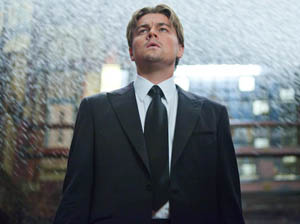|
If Chris Nolan has a bad film in him, it must still be in him, because it's yet to stumble forth onto the screen. With Inception, we may at last be entering into a time when cineastes will no longer be heard to proclaim that The Matrix is intelligent, thoughtful, philosophically deep filmmaking. This is a film practically designed to make other films feel bad about themselves. 
In an unspecified year, Leonardo DiCaprio plays Cobb (a name almost certainly meant to be a reference to Nolan's first film, Following), a cyber-espionage agent for hire who can utilize technology to enter people's dreams and extract information. This is trickier than it sounds, and it already sounds particularly tricky. The mind tends to sense foreign consciousnesses, especially in a world where this sort of neural hacking is a known threat. While you can't get killed in a dream (dying simply wakes you up, though this of course ruins your larceny attempts), you can expericence pain. On top of all this, Cobb's deceased wife Mal has taken to showing up in his dreams and sabotaging them, his own personal Monster From The Id. As the story begins, Cobb is living as an expatriate after being accused of killing his wife. An extremely wealthy client enters his life with promises that he can use his considerable influence to get the charges dropped, in exchange for one very special assignment: instead of stealing an idea from a competitor, he must instead implant one, a process considered exceedingly difficult if not impossible. Cobb believes it can be done, and it appears that he has nothing to lose. If only it was so simple, despite being not simple in the slightest. Let me just state this up-front: Nolan is a smart director. It's very easy for a film treading in these waters to fail-not necessarily in a financial sense, but as an effective and logical piece of narrative. It's the ideas about this unabashedly cyberpunk story that interest him, not the flashy clothes and awesome tech that other productions often emphasize. The device that allows dream-hacking is a gadget in a silver suitcase (reminiscent of Blade Runner's Voight-Kampff machines), which doesn't even get a name. No amount of running time is wasted on explaining how this fictional contraption works, since it wouldn't, and a made-up explanation doesn't enhance our understanding of the story. There's a pretty standard convention in illusory narratives, wherein the protagonists believe they have escaped the illusion only to find themselves still inside it (for a convenient example, pick any given episode of Star Trek: The Next Generation's penultimate season). Inception's very first scene introduces this idea, for far from being some hackneyed attempt at a twist, the idea of multiple strata in dreams is central to the film's unfolding. While some might complain of the plot's inordinate complexity, there's a logic to all of it. Whether or not dreams could really work in the manner depicted is rather beside the point. The film establishes rules and sticks to them, ensuring that anyone paying close attention can definitively keep track of the proceedings without being lost in the muck of ill-defined notions. 
In case you got the wrong impression, I wasn't meaning to imply in my first paragraph that Inception deals with philosophy on a complex level; I'm not especially convinced that a film really can present such ideas without simply having a filmed scene of some professor pontificating at length on them, which would dramatically be a trip straight to Boringsville. What I mean is that this is a film which dares to ask the question of whether a thing is innately of greater worth than our own subjective and flawed interpretation of that thing, without ultimately telling we the audience what answer we should agree with. Unlike most films dabbling in highbrow concepts such as the aforementioned The Matrix or Dark City, this film actually engages a discussion of the concepts in question instead of simply name-dropping them, and then leaves them ambiguous, both in the minds of the viewer and of the characters. If you want to be told how or what to think, watch a less intelligent movie. Despite a great deal of combat, shooting and explosions, this is first and foremost a personal film about the weight and value of our own experiences, be they "real" or not. Decades from now, when film historians are cataloguing the best sci-fi films of this era, Inception will be hanging out at the top of the heap, and Kung-Fu Keanu will be forgotten as a passing demonstration of empty style. -review by Matt Murray
|
|
||||||||